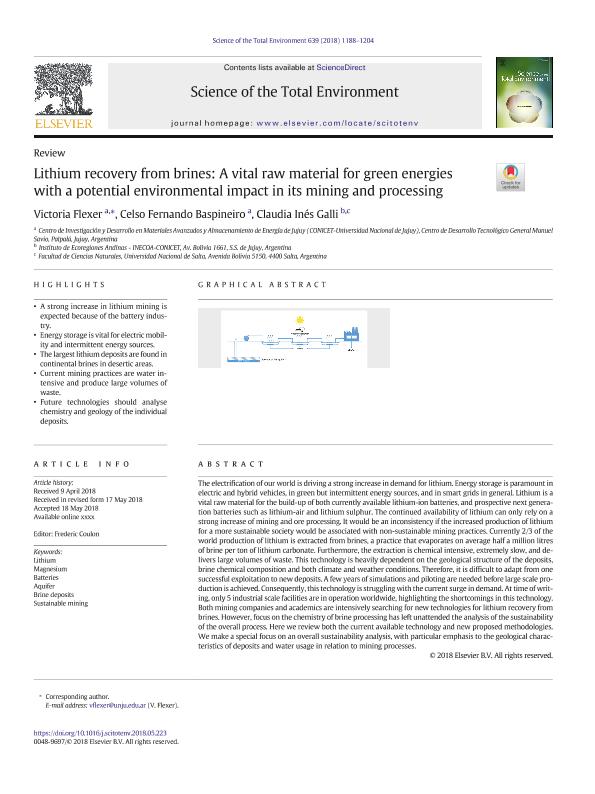Artículo
Lithium recovery from brines: A vital raw material for green energies with a potential environmental impact in its mining and processing
Fecha de publicación:
10/2018
Editorial:
Elsevier
Revista:
Science of the Total Environment
ISSN:
0048-9697
Idioma:
Inglés
Tipo de recurso:
Artículo publicado
Clasificación temática:
Resumen
The electrification of our world is driving a strong increase in demand for lithium. Energy storage is paramount in electric and hybrid vehicles, in green but intermittent energy sources, and in smart grids in general. Lithium is a vital raw material for the build-up of both currently available lithium-ion batteries, and prospective next generation batteries such as lithium-air and lithium sulphur. The continued availability of lithium can only rely on a strong increase of mining and ore processing. It would be an inconsistency if the increased production of lithium for a more sustainable society would be associated with non-sustainable mining practices. Currently 2/3 of the world production of lithium is extracted from brines, a practice that evaporates on average half a million litres of brine per ton of lithium carbonate. Furthermore, the extraction is chemical intensive, extremely slow, and delivers large volumes of waste. This technology is heavily dependent on the geological structure of the deposits, brine chemical composition and both climate and weather conditions. Therefore, it is difficult to adapt from one successful exploitation to new deposits. A few years of simulations and piloting are needed before large scale production is achieved. Consequently, this technology is struggling with the current surge in demand. At time of writing, only 5 industrial scale facilities are in operation worldwide, highlighting the shortcomings in this technology. Both mining companies and academics are intensively searching for new technologies for lithium recovery from brines. However, focus on the chemistry of brine processing has left unattended the analysis of the sustainability of the overall process. Here we review both the current available technology and new proposed methodologies. We make a special focus on an overall sustainability analysis, with particular emphasis to the geological characteristics of deposits and water usage in relation to mining processes.
Palabras clave:
AQUIFER
,
BATTERIES
,
BRINE DEPOSITS
,
LITHIUM
,
MAGNESIUM
,
SUSTAINABLE MINING
Archivos asociados
Licencia
Identificadores
Colecciones
Articulos(CCT - SALTA-JUJUY)
Articulos de CTRO.CIENTIFICO TECNOL.CONICET - SALTA-JUJUY
Articulos de CTRO.CIENTIFICO TECNOL.CONICET - SALTA-JUJUY
Articulos(INECOA)
Articulos de INSTITUTO DE ECORREGIONES ANDINAS
Articulos de INSTITUTO DE ECORREGIONES ANDINAS
Citación
Flexer, Victoria; Baspineiro, Celso Fernando; Galli, Claudia Inés; Lithium recovery from brines: A vital raw material for green energies with a potential environmental impact in its mining and processing; Elsevier; Science of the Total Environment; 639; 10-2018; 1188-1204
Compartir
Altmétricas




